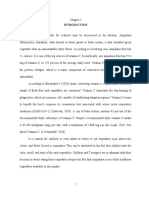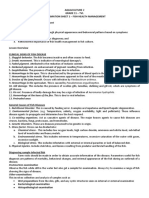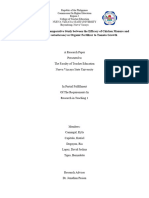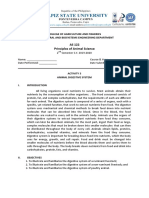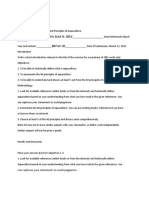0 ratings0% found this document useful (0 votes)
285 viewsEfficacy of Different Level of Tubli Revisable
Efficacy of Different Level of Tubli Revisable
Uploaded by
Lady Anne NazaroThis document discusses research on the efficacy of fermented fruit juice (FFJ) with different levels of tubli (Derris elliptica Benth) root extract in improving the growth and yield of eggplant. The study aims to determine the effects of tubli root extract on various factors related to eggplant cultivation. Tubli root extract has been shown to have insecticidal, rodenticidal, larvicidal and antioxidant properties making it a promising botanical pesticide for sustainable agriculture. The document reviews related literature on the pesticidal effects of tubli extract and its potential to increase crop yields and farmer incomes in an environmentally friendly way.
Copyright:
© All Rights Reserved
Available Formats
Download as PPT, PDF, TXT or read online from Scribd
Efficacy of Different Level of Tubli Revisable
Efficacy of Different Level of Tubli Revisable
Uploaded by
Lady Anne Nazaro0 ratings0% found this document useful (0 votes)
285 views19 pagesThis document discusses research on the efficacy of fermented fruit juice (FFJ) with different levels of tubli (Derris elliptica Benth) root extract in improving the growth and yield of eggplant. The study aims to determine the effects of tubli root extract on various factors related to eggplant cultivation. Tubli root extract has been shown to have insecticidal, rodenticidal, larvicidal and antioxidant properties making it a promising botanical pesticide for sustainable agriculture. The document reviews related literature on the pesticidal effects of tubli extract and its potential to increase crop yields and farmer incomes in an environmentally friendly way.
Original Description:
Thesis Unpresented
Copyright
© © All Rights Reserved
Available Formats
PPT, PDF, TXT or read online from Scribd
Share this document
Did you find this document useful?
Is this content inappropriate?
This document discusses research on the efficacy of fermented fruit juice (FFJ) with different levels of tubli (Derris elliptica Benth) root extract in improving the growth and yield of eggplant. The study aims to determine the effects of tubli root extract on various factors related to eggplant cultivation. Tubli root extract has been shown to have insecticidal, rodenticidal, larvicidal and antioxidant properties making it a promising botanical pesticide for sustainable agriculture. The document reviews related literature on the pesticidal effects of tubli extract and its potential to increase crop yields and farmer incomes in an environmentally friendly way.
Copyright:
© All Rights Reserved
Available Formats
Download as PPT, PDF, TXT or read online from Scribd
Download as ppt, pdf, or txt
0 ratings0% found this document useful (0 votes)
285 views19 pagesEfficacy of Different Level of Tubli Revisable
Efficacy of Different Level of Tubli Revisable
Uploaded by
Lady Anne NazaroThis document discusses research on the efficacy of fermented fruit juice (FFJ) with different levels of tubli (Derris elliptica Benth) root extract in improving the growth and yield of eggplant. The study aims to determine the effects of tubli root extract on various factors related to eggplant cultivation. Tubli root extract has been shown to have insecticidal, rodenticidal, larvicidal and antioxidant properties making it a promising botanical pesticide for sustainable agriculture. The document reviews related literature on the pesticidal effects of tubli extract and its potential to increase crop yields and farmer incomes in an environmentally friendly way.
Copyright:
© All Rights Reserved
Available Formats
Download as PPT, PDF, TXT or read online from Scribd
Download as ppt, pdf, or txt
You are on page 1of 19
Efficacy of FFJ with Different
Level of Tubli (Derris elliptica
Benth) Root Extract in the
Growth and Yield of Eggplant
(Solanum melongena L.)
Nazaro, Lady Anne M.
BSA III-CROP SCIENCE
I. Introduction
There are a lot of synthetic pesticides that can
prevent and control pests even in a large farm area
(Schreinemachers et al., 2011), however, rampant use
of synthetic pesticides alone can adversely affect the
environment and health, and even reduce income.
(Mitra et al., 2011; Agri-Green, 2011b; Edwards,
2013). Akwar et al. (2009) also believed that the
overuse of synthetic pesticides could deplete soil
fertility and yield. Hence, Sparagano et al. (2016)
suggested that the use of synthetic pesticides must be
reduced to prevent deterioration of soil and income.
Crop production is the art of
producing crops at increasing productivity and
quality of products to maximize the monetary
returns while eliminating the negative impact
on the environment (Basra et al., 2018). One
of the intensive cultivation management to
achieve this goal and make agriculture
sustainable is through the application of
organic pesticides to control the occurrence
and damage of pests to crops (Matthew,
2008).
One of the sources of organic pesticides
is the plant that has pesticidal properties.Tubli
(Derris elliptica Benth) is one of the most
plants possessing strong pesticidal properties
(Prakash, 2018).Tubli is a leguminous plant
that originated in Southern Asia and the
Southwest Pacific islands (The Plant List,
2010). Its crude extracts had been discovered
and used as a pesticide by some of the farmers
and researchers in various countries including
the Philippines (Devi, 2016).
The use of a botanical pesticide like
Tubli plant crude extracts is one of the
practical methods for those farmers who are
not capable to incur the expensive commercial
pesticides. Besides, this is the best input in
attaining sustainable agriculture. Utilization of
the available resources for farming can be
practiced only if farmers know the importance
and uses of this indigenous botanical pesticide
(Wilcox, 2011; Sola et al., 2014).
Fermented fruit juice, also known as
FFJ, acts as an organic fertilizer for plants and gardens.
This liquid increases nutrients in the soil and therefore in
the plants growing in it, especially potassium levels.
Fermented Fruit Juice can be used to increase the
fruiting process of plants as well as to increase yield in
some leafy green vegetables. It can be used as a foliar
spray as well as indirect application to the soil, where it
feeds the microbiome and increases soil health. Hence,
the researcher became interested to deepen the
knowledge about the benefits of FFJ with Tubli root
extract.
Objectives of the Study
This study aims to determine the
efficacy of Tubli root extract in terms of:
Review of Related Literature
As insecticidal, Tubli roots are effective
against insects not only in the form of
extracts but also in powder. Tubli root
powder can even control the
Balanogastrickolae on kola nut. It was
found out that the application of tubli root
powder at 10g and 15g concentration
performed well resulted in the highest
mortality during the exposure period
(Akunne et al., 2018).
Rodenticidal The tubli (Derris elliptica) can
also be used with the combination of other
botanical pesticides like nami
(Dioscoreahispida). Their combinationis
found to be effective in killing mice. This
is a cheap potential and natural alternative
rodenticide (Torrefiel, 2014).
The tubli was evaluated for its cytotoxicity
and genotoxicity using Vitotox assay. It was
found that tubli is not genotoxic nor
cytotoxic (Chichioco-Hernandez et al.,
2011).
Larvicidal There are a lot of studies on the ethanol
extracts against the larvae of A. aegypti. One of
the effective control was from the tubli plant.
(Komalamisra et al., 2005). Mosquito larvae were also
controlled by larvicidal activity (LC50) of the plant
root. In three hours of treatment, there was a 50%
mortality with the use of tubli crude extracts. (Akunne
et al., 2018). It was also reported that it kills beetles
in potato, raspberry, asparagus and cucumber, and
cabbage worms as well as most of the arthropod
larvae (Cavoski et al., 2008).
Foreign
Antioxidant / Inhibition of Heinz Body Induction Tubli was one of the 20
medicinal plants used in the study using screened aqueous extracts in Thailand
for antioxidant activity and inhibition of Heinz body induction caused by
oxidants. Tubli has also performed the highest percent inhibition of Heinz
body inhibition activity (Palasuwan et al., 2005). Alternative Green Additive to
Increase Rotenone Yield / Roots Rotenone extraction from tubli roots was
conducted using alcohol-based DES or deep eutic solvents as a medium of
extraction. It was found out that the combination of the DES with selective
organic solvent has similar potential and efficacy as ILs in extracting
bioactive constituents in the phytochemical extraction process (Othman et al.,
2015) Extraction Kinetic / Normal Soaking Extraction Method / Effect of
Exposure / Roots The rotenone was found to be sensitive to light and heat. It
cannot be exposed to extreme environments with an improper extraction
system. There is a tendency that the major bioactive compounds will be lost
and its effectiveness of insecticidal action will have deteriorated (Zubairi et al.,
2014).
The use of indigenous botanical pesticides is one of the contributors
to sustainable agriculture (Ignacimuthu and Vendan, 2018). It has
been implemented to be practiced by the farmers. This practice is
still encouraged to be maintained all over the world (Dixon et al.,
2014). Many botanical pesticides including tubli crude extracts are
already recommended to achieve and maintain the concept of
sustainable agriculture (Dimetry, 2012).
Tubli is the most promising botanical pesticide that
promotes a balanced and self-regulated
agricultural system (Indigenous Plants as Natural
Pesticides, 2017). Aside from conserving the soil
fertility and the environment, the application of
botanical pesticides like tubli crude extracts can
increase the monetary returns of the farmers and
sustain the productivity and profitability of their
farms and income, respectively (Alburo and
Olofson, 1987; Geisen, 1999; Javier et al., 2003;
bTacio, 2009; Agri-Green, 2011a).
The government agencies of the United
States used already the tubli as a source of
rotenone for many purposes in fishing and
farming (Tanner et al., 2011; Schmidt, 2014;
Daroff and aminoff, 2014)
You might also like
- Ntilizo - Maxino.Zerna - Concept PaperDocument5 pagesNtilizo - Maxino.Zerna - Concept PaperAaron St. Yves GoNo ratings yet
- 18 Natural Insect AttractantDocument1 page18 Natural Insect AttractantCute Guardian AngelNo ratings yet
- THESISDocument19 pagesTHESISAbby ArmentaNo ratings yet
- Food Prep - MidtermDocument5 pagesFood Prep - MidtermAngelic RiveraNo ratings yet
- Installing or Setting-Up Frames: Aquaculture NC IiDocument32 pagesInstalling or Setting-Up Frames: Aquaculture NC IiJoewellyn LimNo ratings yet
- Final BANQUIAOS-CHAPTER-1-5Document34 pagesFinal BANQUIAOS-CHAPTER-1-5Jovany PalonNo ratings yet
- Topic 1: Basic Concept of Agricultural CropDocument32 pagesTopic 1: Basic Concept of Agricultural CropSally CondesNo ratings yet
- 5 - Aratiles-WHOLE PAPER PDFDocument22 pages5 - Aratiles-WHOLE PAPER PDFCindy MarquezNo ratings yet
- Fermented Alcoholic Beverage: A Banana Wine InventionDocument16 pagesFermented Alcoholic Beverage: A Banana Wine InventionNickolaNo ratings yet
- Edited& CriticsDocument27 pagesEdited& CriticsMeliza Tubo - KusinNo ratings yet
- Holy Cross College: "Allium Sativum As Natural Pesticide: An Experimental Study"Document13 pagesHoly Cross College: "Allium Sativum As Natural Pesticide: An Experimental Study"Mikko RamosNo ratings yet
- Course Calendar HORT 2 - Plant Propagation and Nursery ManagementDocument1 pageCourse Calendar HORT 2 - Plant Propagation and Nursery ManagementFrancis Leo LoberanesNo ratings yet
- Agricultural Crop ProductionDocument10 pagesAgricultural Crop ProductionElisha Liwag100% (1)
- Worksheet 1Document3 pagesWorksheet 1Joewellyn LimNo ratings yet
- Chapter 1 Research Edited 1Document14 pagesChapter 1 Research Edited 1Bernadette TiproNo ratings yet
- q4-Afa-Animal Production Poultry 7 - 8-Week 1Document4 pagesq4-Afa-Animal Production Poultry 7 - 8-Week 1Ralph DivinaNo ratings yet
- Lansium Domesticum, Also Known As Langsat, Buahluku or Lanzones, Is A Species ofDocument3 pagesLansium Domesticum, Also Known As Langsat, Buahluku or Lanzones, Is A Species ofLatifah EmamNo ratings yet
- Grafting RambutanDocument2 pagesGrafting RambutanjeffreyNo ratings yet
- RESEARCH PAPER IMRAD (Edited)Document14 pagesRESEARCH PAPER IMRAD (Edited)Bea Mikaela RedobladoNo ratings yet
- Andales-Et-Al. With YouDocument26 pagesAndales-Et-Al. With YouqwertyNo ratings yet
- Oap Ncii Summative 4 Final TermDocument1 pageOap Ncii Summative 4 Final TermRocky B AcsonNo ratings yet
- Review of Related Literature-PomeloDocument3 pagesReview of Related Literature-PomeloCarmela Villadolid100% (1)
- Animal Science-Efficacy...Document15 pagesAnimal Science-Efficacy...jessamynn.corpuzNo ratings yet
- Thesis Chapter 1Document5 pagesThesis Chapter 1Erialc SomarNo ratings yet
- Comparative Study of Ampalaya and Malunggay Leaves Extract As Growth Activators For Tomato SeedDocument5 pagesComparative Study of Ampalaya and Malunggay Leaves Extract As Growth Activators For Tomato SeedKristine Louise Aldridge100% (1)
- CleaningDocument3 pagesCleaningFlorenda IguinNo ratings yet
- Final 364920591-Final-Lesson-Plan-1-Intro-To-PestsDocument17 pagesFinal 364920591-Final-Lesson-Plan-1-Intro-To-Pestsapi-380315038100% (1)
- AS 122 Principles of Animal ScienceDocument7 pagesAS 122 Principles of Animal ScienceChristian Dave Rone100% (1)
- Chili Pepper Leaf ExtractDocument10 pagesChili Pepper Leaf ExtractToram NewNo ratings yet
- Fish Products and Packaging SyllabusDocument18 pagesFish Products and Packaging SyllabusAngel OberioNo ratings yet
- Promoting Bottle Gourdy Candy As A Winter Melon Substitute in Making Local CandiesDocument5 pagesPromoting Bottle Gourdy Candy As A Winter Melon Substitute in Making Local CandiesPaula Joy OngNo ratings yet
- Grade 11 - Q4 W3Document19 pagesGrade 11 - Q4 W3zulhaminmangelen08No ratings yet
- Life Biological Principles and The Science of ZoologyDocument64 pagesLife Biological Principles and The Science of ZoologyKempets100% (1)
- Fish ProcessingDocument72 pagesFish Processingcatherine botardoNo ratings yet
- Acceptability of Citrullus Lanatus Candy (Edited)Document39 pagesAcceptability of Citrullus Lanatus Candy (Edited)jemuelpachecoNo ratings yet
- CHAPTER 1 Investegatory ReasearchDocument3 pagesCHAPTER 1 Investegatory ReasearchAngelica Alican Cerbito50% (2)
- Tools, Equipment and Paraphernalia Grade 9Document29 pagesTools, Equipment and Paraphernalia Grade 9Micaela BautistaNo ratings yet
- Gardening RubricsDocument2 pagesGardening RubricsjamejoyfconsingNo ratings yet
- Arrowroot Powder vs. Cornstarch: Why Arrowroot Powder Is A Better ChoiceDocument53 pagesArrowroot Powder vs. Cornstarch: Why Arrowroot Powder Is A Better ChoiceRho Vince Caño MalagueñoNo ratings yet
- Agri Module 1 L2Document6 pagesAgri Module 1 L2Joanna Fe JaimNo ratings yet
- Shiena Mae R. Ibus Bsfas 1B: Can Rephrase Your Statements To Avoid PlagiarismDocument5 pagesShiena Mae R. Ibus Bsfas 1B: Can Rephrase Your Statements To Avoid PlagiarismShiena IbusNo ratings yet
- Yao Pickling Information SheetDocument9 pagesYao Pickling Information SheetEmmanuel BoNo ratings yet
- Tle 8Document60 pagesTle 8Reygina Mae Sibayan PalaganasNo ratings yet
- Week 7-2nd Quarter-Feb.15-27,2021 Food Processing 12Document14 pagesWeek 7-2nd Quarter-Feb.15-27,2021 Food Processing 12Maymay AuauNo ratings yet
- Aquaculture 2nd QuarterDocument111 pagesAquaculture 2nd QuarterChristopher SilangNo ratings yet
- CBLM-Fish CaptureDocument34 pagesCBLM-Fish CaptureJARED DE JESUSNo ratings yet
- Production and Innovation of Kamias (Averrhoa Bilimbi) As A Tea Powder For Treating RheumatismDocument5 pagesProduction and Innovation of Kamias (Averrhoa Bilimbi) As A Tea Powder For Treating RheumatismJassyleigh Kryzl LargoNo ratings yet
- Lesson Plan in TLE 6: I. ObjectivesDocument3 pagesLesson Plan in TLE 6: I. ObjectivesRoseNo ratings yet
- LESSON PLAN in TVL 12Document9 pagesLESSON PLAN in TVL 12msalino.tcNo ratings yet
- Syllabus: College of Teacher Education Bachelor of Technology and Livelihood Education AY: 2019-2020 Curriculum: BTLEDDocument10 pagesSyllabus: College of Teacher Education Bachelor of Technology and Livelihood Education AY: 2019-2020 Curriculum: BTLEDMae CaspeNo ratings yet
- Title - Page of Kakawate LEaves & Chili Fruits Extract PDFDocument6 pagesTitle - Page of Kakawate LEaves & Chili Fruits Extract PDFPrixyne AlojadoNo ratings yet
- Information Sheet 11.1 PREPARING SEAFOOD DISHESDocument2 pagesInformation Sheet 11.1 PREPARING SEAFOOD DISHESkrizylNo ratings yet
- Cultural PracticesDocument3 pagesCultural PracticesrexazarconNo ratings yet
- The Problem and Background of The StudyDocument6 pagesThe Problem and Background of The StudyAileen ElegadoNo ratings yet
- Chapter-1-5-RS Stem The Effectiveness of Coco Coir and Chicken ManureDocument71 pagesChapter-1-5-RS Stem The Effectiveness of Coco Coir and Chicken Manurecj OngonionNo ratings yet
- Formulation Optimization of Onion-Flavored HopiaDocument17 pagesFormulation Optimization of Onion-Flavored HopiaMe Gustas SCOUPSNo ratings yet
- Pre Defend Power Point PresentationDocument24 pagesPre Defend Power Point PresentationFranz Joseph DomingoNo ratings yet
- Module 5 Drying and DehydrationDocument3 pagesModule 5 Drying and Dehydrationdayana.rosesandoval01100% (1)
- Pests of Field Crops and Pastures: Identification and ControlFrom EverandPests of Field Crops and Pastures: Identification and ControlPT BaileyNo ratings yet
- Owth and Yield Performances of (Abelmoschus Esculentus) (Nur Suraya Abdullah) PP 230-233Document4 pagesOwth and Yield Performances of (Abelmoschus Esculentus) (Nur Suraya Abdullah) PP 230-233upenapahangNo ratings yet
- Pearson Catalog Bioscience 2019 FinalDocument96 pagesPearson Catalog Bioscience 2019 FinalJeetu RaoNo ratings yet
- DISS - Mod9 - Dominant Approaches and Ideas of Social Sciences - Hermeneutical Phenomenology and Human - Environment SystemsDocument14 pagesDISS - Mod9 - Dominant Approaches and Ideas of Social Sciences - Hermeneutical Phenomenology and Human - Environment SystemsBreaahNo ratings yet
- The Residual Forest at Lucban Mountain FarmDocument52 pagesThe Residual Forest at Lucban Mountain FarmVin Lava100% (2)
- 8TH Eng QPDocument6 pages8TH Eng QPshakthiramesh0811No ratings yet
- Factors of ProductionDocument4 pagesFactors of Productionhilary bassaraghNo ratings yet
- UNIT - 4 Agriculture (English) #I - MagnusDocument14 pagesUNIT - 4 Agriculture (English) #I - Magnusvickyraghuwanshi695No ratings yet
- TLE10 - ACP-NC-II - G10 - Q1 - Mod2 - Determine Defective Tools and Equipment According To Operation Manuals - v3Document24 pagesTLE10 - ACP-NC-II - G10 - Q1 - Mod2 - Determine Defective Tools and Equipment According To Operation Manuals - v3carolina lizardo100% (1)
- Forest ManagementDocument6 pagesForest ManagementSUMIT naikNo ratings yet
- Uniben Science 2Document47 pagesUniben Science 2ioyindamola777100% (1)
- Ministry of Agriculture Mid Term Development Plan Institution: Department of Agrarian Development (DAD)Document6 pagesMinistry of Agriculture Mid Term Development Plan Institution: Department of Agrarian Development (DAD)Vijayakumar RajaratnamNo ratings yet
- 2 - Tender For Gamma Irradiation PlantDocument24 pages2 - Tender For Gamma Irradiation PlantShubhrashree MajiNo ratings yet
- Biology Grade 7Document153 pagesBiology Grade 7ConsistencyNo ratings yet
- Rabbit Gen: Perennial Fodder Plants - Potential Feed Sources in Nutrition of RabbitsDocument7 pagesRabbit Gen: Perennial Fodder Plants - Potential Feed Sources in Nutrition of RabbitsPaola EspitiaNo ratings yet
- Apil, Kaysiah Jane GDocument1 pageApil, Kaysiah Jane GIsrael BalagsoNo ratings yet
- Uv - tz25, Ogo - Lz2o, OooDocument10 pagesUv - tz25, Ogo - Lz2o, OooDear PrudenceNo ratings yet
- Watershed PresentationDocument19 pagesWatershed Presentationmamta19sharma100% (1)
- 2 - g8 - The Wonderful Pear TreeDocument8 pages2 - g8 - The Wonderful Pear Treejustinbasic100% (2)
- Insect Decline in The Anthropocene Death by ADocument10 pagesInsect Decline in The Anthropocene Death by ADaltro OliveiraNo ratings yet
- Municipal Organic Agriculture Roadmap Presentation: MUNICIPALITY OFDocument10 pagesMunicipal Organic Agriculture Roadmap Presentation: MUNICIPALITY OFAbner DondeNo ratings yet
- Maize Production Literature ReviewDocument7 pagesMaize Production Literature Reviewc5sq1b48100% (1)
- Marketing FunctionsDocument25 pagesMarketing FunctionsSuny JubayerNo ratings yet
- MATERI KULIAH Ekologi Tanaman 2011Document134 pagesMATERI KULIAH Ekologi Tanaman 2011Elsa Ade Komala100% (1)
- Urban Farming Guidebook 2013 PDFDocument61 pagesUrban Farming Guidebook 2013 PDFJhon Edison Bohorquez MartinezNo ratings yet
- DPP-Pesticides Section FinalDocument16 pagesDPP-Pesticides Section FinalhijabNo ratings yet
- Technology Licensing Price List CompleteDocument16 pagesTechnology Licensing Price List Completekotiyadav1983No ratings yet
- SPHI21 Feed The Future RwandaDocument2 pagesSPHI21 Feed The Future RwandamishellNo ratings yet
- BryophytesDocument5 pagesBryophytesGilbert DullerNo ratings yet
- Innovation Methodologies-Custord AppleDocument8 pagesInnovation Methodologies-Custord Applea_nidarshanNo ratings yet
- DLL - Tle 6 - Q2 - W6Document3 pagesDLL - Tle 6 - Q2 - W6Rhadbhel Pulido100% (10)









